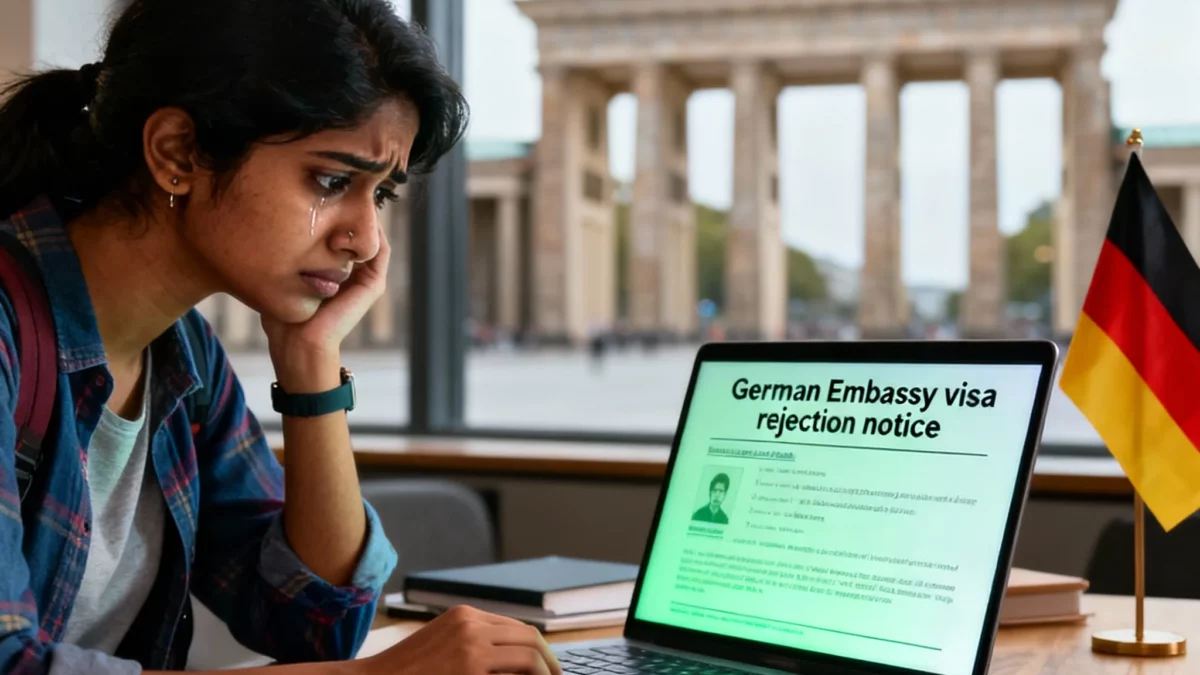Top Germany Student Visa Rejection Reasons

Estimated reading time: 4 minutes
Germany remains one of the top study destinations for Indian students each year. But here’s the tough truth: even if you have an admission letter and a blocked account, your visa is not guaranteed. Many students are shocked to receive rejections, often for avoidable reasons. This article breaks down the most common Germany student visa rejection reasons, highlights real embassy cases from India, and offers smart strategies to avoid pitfalls—whether you’re applying for the first time or after a refusal.
Table of contents
- The Most Common Germany Student Visa Rejection Reasons
- Real Case: Punjab Student Rejected for a Bachelor’s in Germany (2025)
- What to Do After a German Student Visa Rejection
- Where Traditional Consultants Fail Many Indian Students
- How Bluehawks Supports Students Beyond the Basics
- How to Maximize Your German Student Visa Chances
- Free Download: Germany Student Visa Success Checklist (2026)
- Final Thoughts
The Most Common Germany Student Visa Rejection Reasons
Visa officers do not approve student visas purely based on admission. They evaluate the logic, clarity, and credibility behind your entire application. Here are the top Germany student visa rejection reasons that Indian students face:
1. Weak Academic Fit or Course Mismatch
Visa officers check if your past education connects to your chosen course. If you’re switching fields or choosing a program without demonstrable preparation, it may lead to doubts.
Tip: Build a logical narrative in your SOP. Explain how your education, life experiences, and interests align with the course you want to pursue in Germany.
2. Insufficient Language Requirements
Your language score reflects your readiness for a rigorous academic environment. Even though some private universities accept IELTS 6.0, consulates may not. Visa officers want confidence that you can succeed in the program.
Ideal score: IELTS 6.5 or more for English-taught courses. Add basic German language proof if your course involves German modules or context.
3. Poor Academic Preparedness or Clarity
Germany’s academic system demands seriousness. If your grades, course history, or explanation of fit appear weak or confusing, the application may be refused.
4. Generic or Poorly Written SOP
An SOP is your personal pitch. If it reads like a template, feels vague, or seems copied, it gives visa officers a reason to doubt your intent or motivation.
Avoid: Overly casual language, emotional filler, or generic lines like “I’ve always wanted to study abroad.”
5. Questionable or Low-Credibility University Choices
Some private German universities accept students without much academic screening. This may cause visa officers to suspect the real purpose of study. When university credibility is low, it undermines the legitimacy of the study plan.
Real Case: Punjab Student Rejected for a Bachelor’s in Germany (2025)
One of our clients from Punjab applied for a Bachelor of Arts in Photography and New Media at a private German university. The German Embassy in New Delhi refused the visa for the following reasons:
- No academic connection between previous education and the program
- Campus and program location details were incorrect
- IELTS score of 6.0 insufficient for university-level study
- Admission appeared based on non-academic criteria
Lesson: It’s not enough to submit documents. You need to connect the academic dots and present a coherent story.
What to Do After a German Student Visa Rejection
You will have two main options:
- File a remonstration (appeal) against the decision
- Reapply with improved documentation and reasoning
Whichever you choose, make sure you understand the core reason for rejection and address it directly.
Where Traditional Consultants Fail Many Indian Students
Most consultants still rely on:
- One-size-fits-all SOPs
- Generic university lists based on commissions
- No profile screening or academic alignment check
- No visa-specific preparation
This leads to half-baked applications and avoidable refusals.
How Bluehawks Supports Students Beyond the Basics
At Bluehawks EduAbroad, our approach is different.
- No university commissions. We only suggest what’s best for your profile and visa success.
- Personalized narrative-building for SOPs with clear visa logic.
- Mock interview practice based on real consulate patterns from Delhi, Mumbai, and Chennai.
- Dedicated rejection analysis and reapplication strategy for previously refused students.
Each application is treated as unique because students are unique. And that makes all the difference.
How to Maximize Your German Student Visa Chances
Here is a quick checklist to improve your chances:
- Choose a course that relates to your background or proves value if it’s a major shift
- Maintain accuracy across application, SOP, and interview answers
- Strengthen language scores where possible
- Verify university/program credibility (especially if applying to private institutions)
- Include a compelling and authentic study and return plan
Free Download: Germany Student Visa Success Checklist (2026)
Want to be sure you’re submitting a strong application?
🎯 Download our 2026 Visa Success Blueprint, including:
- Visa officer insights from past rejections
- SOP template sections that speak to both university and embassy
- Proven questions from German visa interviews in India
- Document and compliance checklist you can reuse
👉 Click here to get your free copy
Final Thoughts
Understanding these Germany student visa rejection reasons can save your study plans. With proper preparation—and the right support—you can overcome these challenges.
At Bluehawks, we’ve helped hundreds of Indian students fulfill their German education goals, including those who had been rejected before. If you’re serious about studying in Germany and want guidance that prioritizes your future, we’re here to support you.
Ready to get started? Reach out. Your dream university is waiting.
💬 Chat with our 24/7 chat support team, just tap on that WhatsApp button on the right bottom of your screen 👉



